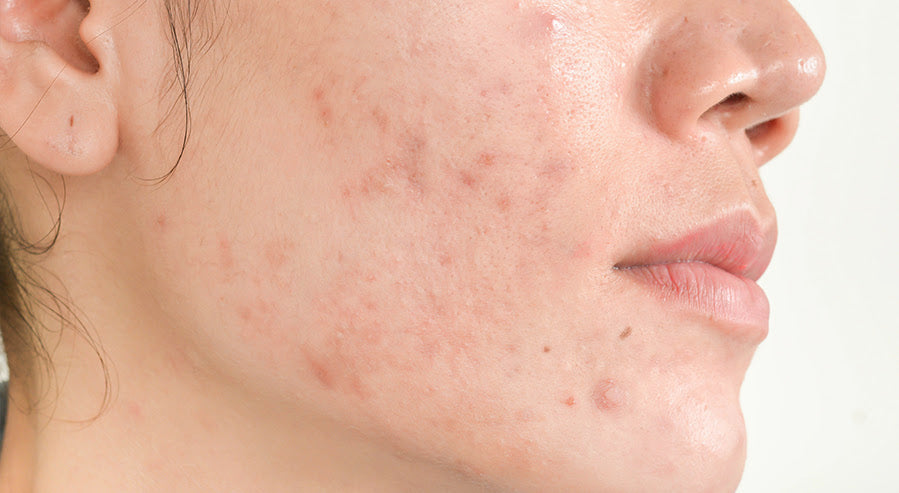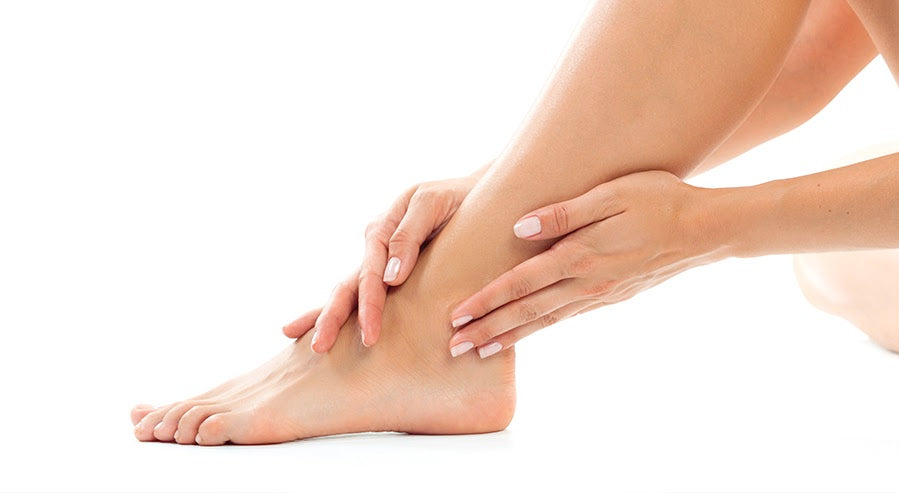Epsom salt is incredible in skincare routines, known in many homes for improving skin health. Let me dig into how it does wonders for your skin.
You can scrub away dead skin cells using Epsom salt as an exfoliant, improving your skin's texture. Also, its magnesium can help lessen inflammation and redness, which makes your skin tone look more even.
In my opinion, Epsom salt is a solid pick for better skin. Whether you're soaking in it or applying it as a paste, it's a simple yet effective way to smooth out your skin and address common issues.
Let's talk about some ways to add it to your daily schedule!
How Does Epsom Salt Soothe the Skin?
Epsom salt baths could help your skin! They're packed with magnesium and sulfate; when these dissolve in water, they might just make your skin a bit happier by hydrating it and cutting down on inflammation. But, I have to say, the science isn't all there yet to fully prove it.
You see, magnesium is super important for keeping your skin balanced, firm, and flexible. Also, Epsom salt is great for scrubbing away dead skin - making your skin smoother and maybe even more moisturized. But here's the catch: we're not totally sure how well your skin can actually soak up that magnesium or if it really bumps up your body's levels.

Because the evidence is a bit shaky, it's smart to tread lightly. If you have kidney issues or react funny to magnesium, you definitely want to chat with a doc before talking about an Epsom salt bath schedule. Just to be on the safe side and make sure it's a good fit for you.
So, while Epsom salt seems promising for skin health thanks to its cool ingredients, Remember - it's a bit of a mystery how much it actually helps. In my opinion, it's worth a try; just remember to keep an eye out and see how your skin reacts!
Can Epsom Salt Reduce Muscle Soreness?
Epsom salt often comes up when you're looking for natural ways to ease muscle soreness after a workout. This is mainly due to its magnesium sulfate, which is believed to help with muscle pain. But remember, the science backing these benefits isn't very strong.
You can boost blood flow and feel more comfortable by taking warm baths, which might help with muscle pain. But, whether Epsom salt adds anything extra to this comfort isn't clearly proven by science. Most of the trust in Epsom salt for easing muscle pain and speeding up recovery is based on people's personal stories and traditions, not hard science.

There's a lot of debate around the idea that Epsom salt baths can really send magnesium through your skin to relieve muscle soreness. Current studies haven't shown that this kind of magnesium absorption really makes a big difference for your muscles or soreness. Also, the claims that Epsom salt can reduce inflammation aren't backed up by the thorough research needed to prove them.
Given the shaky scientific support, it might be jumping the gun to say that Epsom salt baths are important for muscle soreness relief. The real benefit might just be from the warm bath itself, which helps you relax and improves your blood circulation. Even with all the stories and long-standing use of Epsom salt, we really need more scientific research to back it up. You might feel better using Epsom salt, but saying its effects are all due to the salt alone might be stretching it; the science just isn't there yet.
The Secret to Better Sleep and Reduced Stress
Epsom salt, or magnesium sulfate as the science people call it, does wonders, like helping you relax and sleep better. Why? Well, magnesium is a big deal for keeping stress at a distance and making your sleep awesome. There's this idea that when you soak in a bath with Epsom salt, the magnesium might just sneak through your skin and do its magic for relaxation and better sleep.
So, you might be wondering, "How does this actually help me sleep better?" I'm glad you asked! Some smart people over at the Journal of Clinical Sleep Medicine did studies that show soaking in an Epsom salt bath can really up your relaxation and sleep game. This means you could fall asleep faster and sleep more soundly. Also, loads of people have said they feel super relaxed and get way better sleep after these baths.

Adding a few drops of really important oils, like lavender or chamomile, to your Epsom salt bath? That's incredible for relaxation. Trust me; it's like a relaxation power-up!
But what about magnesium getting through your skin and doing all this? It's still a bit up in the air with the science crowd. Taking a warm Epsom salt bath definitely sets the stage for a peaceful night, though, no doubt about it.
If you're aiming to kick stress to the curb and score some quality sleep, sliding into an Epsom salt bath before hitting the sheets could be difficult. Just keep in mind that research on whether your skin actually soaks up magnesium is kind of thin. I'd say think of Epsom salt baths as part of a bigger plan for sleeping like a baby and keeping cool as a cucumber.
Gentle Exfoliation with Epsom Salt
Epsom salt is great for exfoliation, especially if you have sensitive skin! Its bigger granules get the job done without being too harsh. You can make your skincare schedule shine by adding Epsom salt; just mix it with some carrier oil like coconut or olive oil. This combo doesn't only get rid of dead skin cells - it also moisturizes, leaving your skin smooth and refined. When you want to exfoliate your face, just mix half a teaspoon of Epsom salt with your creamy cleanser. This mix is gentle yet effective. But remember, keep it away from sensitive areas, especially around your eyes, to avoid any irritation.
Epsom salt is used both for scrubbing and for facial steaming. This method helps open up your pores and clean out any impurities, prepping your skin for more skincare treatments. For those who love DIY skincare, mix Epsom salt with honey, lemon juice, and olive oil for a refreshing facial scrub or a simple body scrub. It's in finding the right balance between scrubbing away the old and keeping your skin nourished. But don't overdo it. Scrubbing too much might break down your skin's protective barrier, which makes it more sensitive.

Here's the thing: Epsom salt is both affordable and easy to find, and it can really boost your skin, which makes it glow and feel smoother. Regular use can really lift up your skincare game. But, I can't stress enough the importance of being gentle and not exfoliating too much. You have to protect your skin's natural defenses and keep irritation at a distance.
Does Epsom Salt Help With Acne?
Epsom salt can be a big game-changer for your skin! It's like a gentle exfoliator that gets rid of dead skin hiding in your pores, which - let's be real - nobody wants because it can cause nasty acne. Also, it has these awesome anti-inflammatory atmospheres that help soothe your skin, which makes it the perfect spot for healing to happen.
When we talk about how effective Epsom salt is for acne, it really comes down to what type of acne you're dealing with. If you have these surface-level annoyances, like blackheads and whiteheads, Epsom salt might just be your new assistant. But, if we're talking about the deep, painful things - think cystic acne - you're probably going to need to see a doctor since Epsom salt might not cut it.
Here's a little pro tip: If you want to try Epsom salt for your acne, it's super easy to get started. Just mix a half-teaspoon with your favorite liquid cleanser or a cup of warm water. Take a cotton ball or pad, dip it in the mix, and gently rub it on your skin in circles. Let it relax there for a few minutes, then rinse it off with warm water. But don't get overexcited and do this more than twice a week; you don't want to end up with irritated or super dry skin.

Before you jump in and cover your whole face with these things, do me a favor and test it on a small area first. You want to make sure your skin doesn't throw a fit. If your skin starts freaking out, just stop using it, alright? And let me be real with you - you have to keep your expectations in check. Epsom salt can totally be a big help, especially for the mild acne crowd, but it's not some magic potion.
So, ready to give your skincare schedule a little boost? Epsom salt might just be what you've been looking for. Just remember what I said, and your skin will thank you!
Does Epsom Salt Help Skin Conditions Like Eczema, Psoriasis, or Dermatitis?
People say Epsom salt, which is mainly magnesium sulfate, helps with skin problems like eczema, psoriasis, and dermatitis. You can find relief from the symptoms of these conditions with Epsom salt baths, though there isn't a lot of strong science to back it up. If you have eczema, you might feel better after taking Epsom salt baths. But remember - this is based on what people say, not hard proof. The same goes for those with psoriasis; you may find that the scaly patches get softer after these baths, but without solid evidence, it's hard to say for sure if it really works.

When it comes to dermatitis, Epsom salt's ability to calm and reduce inflammation is well-known among home remedy fans. But, this reputation comes from its general qualities, not from specific studies on how Epsom salt affects dermatitis. So, if you're thinking about using Epsom salt baths for your skin, it's smart to talk to a doctor or a skin specialist first, especially if your symptoms are bad or you already have skin issues.
It's clear that Epsom salt might help with some skin conditions, but there's a big need for more research and advice from experts. Since what works for skin care can vary a lot from person to person, getting personalized tips from healthcare pros is important.
Epsom Salt for Healthy Feet
It's hard to achieve radiant, smooth skin, right? Well, you can remove dead skin cells effectively by adding Epsom salt to your bath schedule. If rejuvenated skin seems like a distant dream even though you are trying many products, it might be because your skincare schedule is missing effective detoxifying agents. You have to include Epsom salt to make sure your skin gets all the necessary nutrients and oxygen for renewal; it's great for improving blood circulation.
Do you have oily skin? Don't worry! You can regulate sebum production with Epsom salt baths. They're excellent for pulling out excess oils and impurities, which makes your skin feel fresh and balanced. This balance could even reduce your acne breakouts - and let's face it; who wouldn't want that? By maintaining this balance, your skin can effectively fend off environmental stressors.

Also, let's talk about hydration - Epsom salt is huge here. The magnesium in it is important for tackling dry or flaky skin. It works by improving your skin's barrier function and keeping moisture locked in. Hydrated, supple skin is the goal, and Epsom salt helps you hit the mark.
I recommend adding a cup of Epsom salt to your bath 1-2 times a week. It's simple yet so effective for nourishing your skin from the outside. Remember, consistency is important! Making Epsom salt a regular part of your skincare can really boost your skin's health and appearance. Trust me; it's worth a shot!
Finding The Perfect Blend
To get the benefits of Epsom salt baths for your skin, you have to know a few important tips and safety tricks. First off, make sure your tub is cool with Epsom salts; check the maker's guidelines or just ask them to avoid any damage.
I suggest asking a doc if you're good to go for an Epsom salt bath, especially if you have things like high blood pressure or diabetes. You don't want to end up with a bad reaction, right? Epsom salt baths are awesome for chilling your muscles and making your skin feel smoother, but they're not for everyone. If you have open cuts or you're allergic, steer clear - these baths might make things worse.

Staying hydrated is important - drink loads of water before and after your bath. And remember to slap on some moisturizer after to keep your skin soft and stretchy.
When it comes to Epsom salts, less is sometimes more. Stick to the suggested amounts and how often to soak to dodge drying out your skin or other bummers. Adding Epsom salt baths to your schedule in a smart way is what I recommend for keeping things safe and effective.